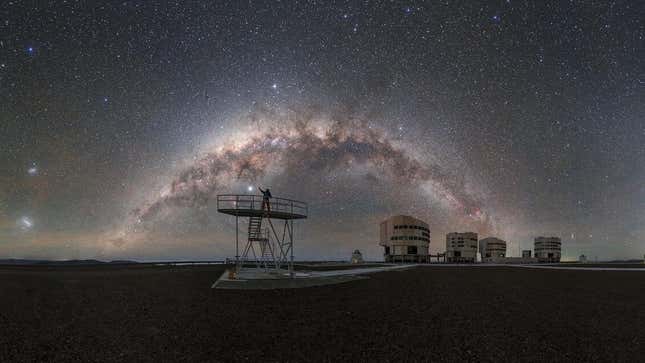
Astronomers looking up at the night skies have started to feel the effects of the growing number of satellites swarming Earth orbit, and they want to do something about it before it’s too late. An international group of astronomy organizations have banded together to petition the United Nations, asking it to form a group that monitors the impact of satellites on astronomy.
The European Southern Observatory (ESO), the International Astronomical Union (IAU), and the Square Kilometer Array Observatory (SKAO) submitted a paper to the United Nations Committee on Peaceful Uses of Outer Space (COPUOS) proposing the creation of a new expert group dedicated to the matter, according to ESO.
A delegation from these astronomy groups attended COPUOS’ 60th Session of the Scientific and Technical Subcommittee (STSC) held from February 6 to 17, during which the most heated topic of debate was how to protect the skies from the interference of large satellite constellations. The proposal to form an expert group was submitted at the end of the session, and signed by COPUOS member states Chile, Spain, Slovakia, Bulgaria, Dominican Republic, Peru, and South Africa, as well as ESO, IAU, and SKAO.
Should the expert group be approved, it would report to the STSC and monitor the impact of satellites on astronomy, seek input from stakeholders, and make suggestions about potential mitigation measures.
“There is a cascade effect from the discussions at COPUOS that can influence governments and companies to act,” Andrew Williams, ESO’s external relations officer, said in a statement. “From the substantial number of countries from all regions of the globe that voiced support for our proposal, we are hopeful we can find a way forward at the main session of the committee.”
COPUOS will hold its main session in June, at which point the organizations hope the proposal will be adopted, as well as other solutions to the issue. Today, there are 8,000 active and defunct satellites orbiting the Earth and that number is expected to massively increase with as many as 100,000 satellites being deployed within the next decade, according to ESO.
That presents a staggering number of satellites, with companies such as SpaceX and Blue Origin building internet megaconstellations in low Earth orbit, and the relatively smaller company AST SpaceMobile launching a huge broadband satellite that is as bright as the stars of Orion. The orbiting satellites interfere with ground-based observations of the skies by adding a lot of noise to images, which they do by reflecting sunlight. The satellites corrupt scientific data being collected by astronomers, appearing as bright streaks in astronomical images.
“If we get to a stage where there are 100,000 or more satellites, irrespective of whatever mitigations the companies can do, they will have substantial impacts on astronomy,” Williams said. “There’s also a danger of impacting our ability to discover potentially dangerous asteroids, as well as damaging the pristine sky that has been a constant of humanity.”
SpaceX has been working with the Federation of Astronomical Societies in an attempt to mitigate the effects of its Starlink satellites on telescopes’ views of the skies. Potential solutions include the use of less reflective materials and altering the orientation of satellites in space. ESO and its partners are hoping for a collaborative effort between the satellite industry, the government, and astronomers “to reach a satisfactory balance between the need for the evolution of the low-Earth orbit space economy and the need protect the science of astronomy and the pristine visibility of the night sky,” ESO wrote in its statement.
More: Huge ‘Cell Phone Towers in Space’ Pose Major Threat to Radio Astronomy, Scientists Warn